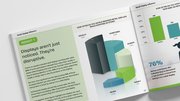News
Report: Customer satisfaction strong in 4Q 2009
February 15, 2010
Customer satisfaction with the goods and services that Americans buy remains strong in the fourth quarter of 2009, according to the American Customer Satisfaction Index (ACSI). The index is largely unchanged, dipping a mere 0.1 percent from the previous quarter to 75.9 on the ACSI's 100-point scale, and remains much higher than it was prior to the recession and also slightly higher than this time one year ago.
Because economic recovery is highly dependent on consumer spending and high levels of customer satisfaction tend to strengthen consumer demand, the latest ACSI reading does not add to more economic woes. Despite anecdotal evidence to the contrary, most companies are providing good customer service and many have very satisfied customers.
"As long as unemployment remains high and credit tight, it is difficult to see how we can get to a sustainable pace of consumer spending growth," said Professor Claes Fornell, head of the ACSI and author of The Satisfied Customer: Winners and Losers in the Battle for Buyer Preference. "But it is not all bad: the ‘will to spend' is evidenced by high customer satisfaction. The issue is whether or not consumers have the ‘means to spend.' The recent news about the decline in unemployment and the rise in manufacturing hiring may not only lead to more people working, but may also dampen the fear of job loss. If so, the means to spend will face less of a hurdle."
As the stock market rebounded in 2009, the rewards have been greater for those companies with improving ACSI scores. On average, companies that did well in ACSI saw their stocks increase by 75 percent, while stock prices for those with declining ACSI scores rose 22 percent over the same period.
Customer satisfaction with theretail sector, which includes department and discount stores, specialty retail stores, supermarkets, gas stations, and health and personal care stores, gains 1.3 percent to an ACSI score of 76.2.
Nordstrom maintains its lead among department and discount stores, rising four percent to an all-time high of 83. Several other retailers post large gains, including Target (+4 percent to 80), Dollar General (+5 percent to 79) and Dillard's (+4 percent to 78). Macy's is notable for bucking the otherwise positive trend. Its ACSI score falls 4 percent to an industry low of 71 amid a major 2009 reorganization that shed 7,000 jobs across some 800 store locations.
Among specialty retailers, Barnes & Noble stands out, leading for a third straight year with a score of 84. Office supply retailers rebound from a year ago, with OfficeMax making the biggest move, up 4 percent to 77 to tie Staples (+1 percent). Office Depot follows close behind (+1 percent to 76). Home Depot improves for a second straight year, gaining three percent to 72. The improvement is not enough to move Home Depot up from the bottom of the specialty retail category or to close the gap with rival Lowe's, which gains four percent to an all-time high ACSI score of 79.
Supermarkets are unchanged for a third straight year with an ACSI score of 76, even though food prices dropped after two years of large increases. Publix has been in the lead since 1994 and this year is no exception: the supermarket chain improves five percent to 86, its highest score ever. Safeway moves in the opposite direction one year after undertaking a large-scale store makeover. Its customer satisfaction retreats four percent to 72.
The ACSI score for e-commerce is up 1.8 percent to 81.4, nearly matching its all-time high. Internet retail improves 1.2 percent to 83. Netflix leads, rising 2 percent to 87. The online video rental company has seen sizeable increases in its subscriber base, revenues and stock price over the past year. Amazon (unchanged) and Newegg (down 2 percent) are also strong performers with very high scores of 86. Customer satisfaction with eBay is up one percent to 79, but the auction site hasn't improved much over the years and eBay remains at the bottom of the list.
"Overall, online shopping continues to grow and provide higher levels of customer satisfaction," said Fornell. "Free shipping promotions, competitive pricing, and the ability to browse and research an ever wider selection of merchandise from the comfort of one's home have made online retailing a very attractive and powerful alternative to traditional stores."
The American Customer Satisfaction Index is a national economic indicator of customer evaluations of the quality of products and services available to household consumers in the United States. It is updated each quarter with new measures for different sectors of the economy replacing data from the prior year. The overall ACSI score for a given quarter factors in scores from more than 200 companies in 44 industries and from government agencies over the previous four quarters. The Index was founded at the University of Michigan's Ross School of Business and is produced by ACSI LLC.
 ChatGPT
ChatGPT Grok
Grok Perplexity
Perplexity Claude
Claude




